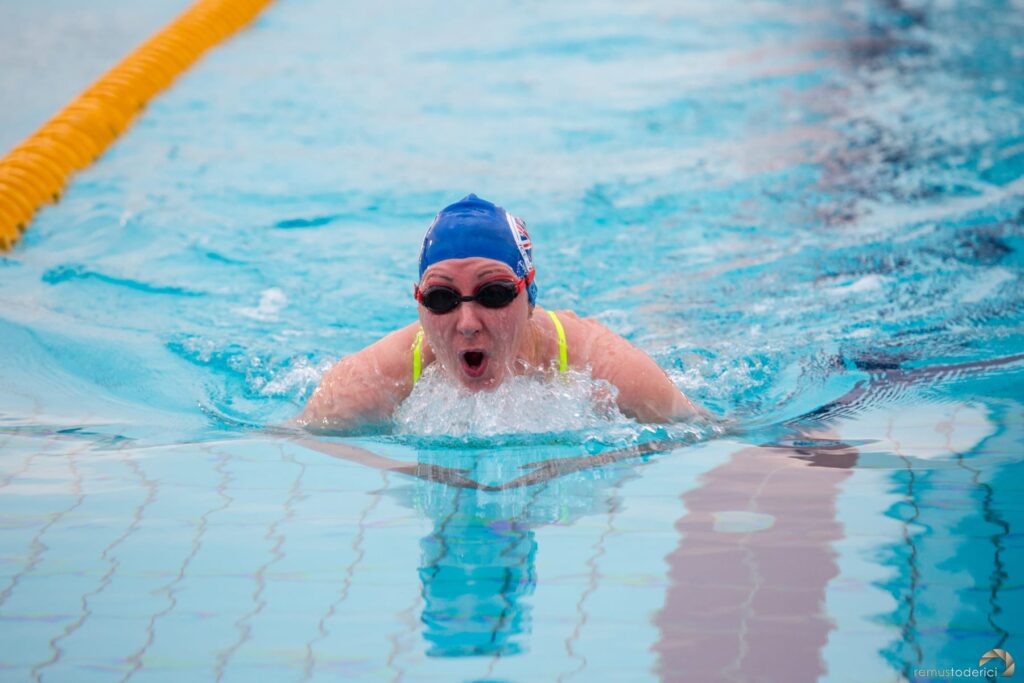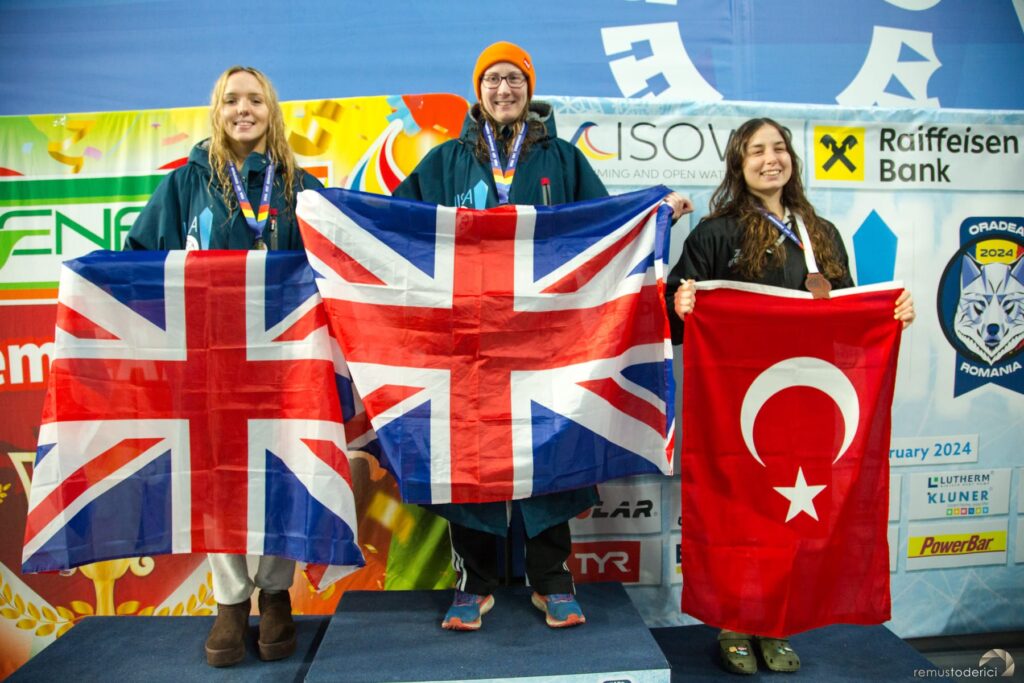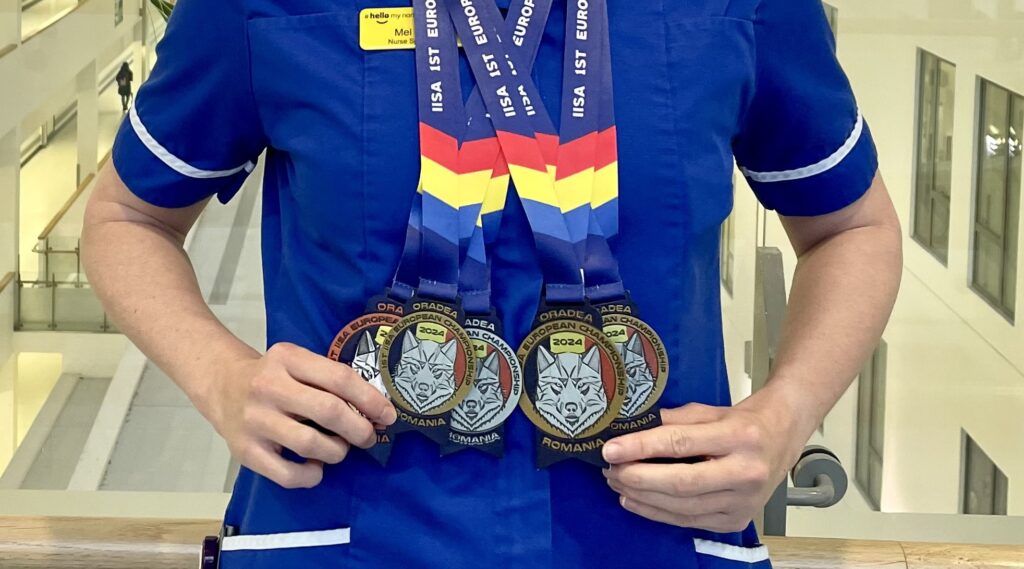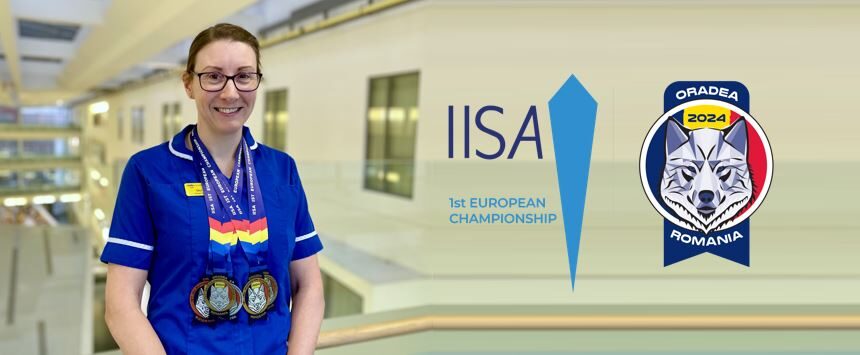Mel, who is a beacon of hope for patients diagnosed with rare and complex blood disorders in Newcastle, recently made waves at the very first European Championships for Ice Swimming in Romania by breaking records and bringing home a fantastic five medals.
Held in the historic city of Oradea, Transylvania in north west Romania, Mel met up with 322 fellow ice swimmers from 27 countries to take part in the Championships.
Ice swimming is classed as an extreme sport as it involves water at temperatures below 5.0 degrees Centigrade.
“Diving at the start of the race is not permitted, everyone has to wear a belt in case they need rescuing and strictly no wetsuits are allowed!” explained Mel.
“The average outdoor pool temperature in Oradea was 4.07 degrees Centigrade which was good news because if it goes even slightly higher than 5.0 degrees, the race is considered nil and void.”

Mel in action at the European Championships for Ice Swimming in Romania #Oradea2024 #IISA
The very idea of swimming in water colder than 5.0 degrees would make most people shrink in fear. However Mel, who is 43, clinched gold for the 100m breaststroke in a British record time of 1:27.81 minutes – also a new world record for her age group (40-44 years).
Mel also won gold in the 50m breaststroke for her age group in world record time followed by bronze overall in the final. In addition, she gained a silver medal in her age group for the 100m freestyle.

Mel Hall on the Medal Rostrum #Oradea2024 #IISA
Mel has now been selected to represent Team GB for the World Championships to be held in January 2025 in Molvena, Northern Italy.
“I go out swimming with my partner as often as we can,” said Mel. “It’s difficult to describe and can be challenging at times for the extremities, but it’s really exhilarating – I have to say I’m pretty much addicted!”
Mel once pursued swimming at a national level before life took her on a different path when she moved from Yorkshire to Newcastle in 1999 to study. She stayed, settled down and started a family.
Her love of swimming reignited and she entered some triathlons but it wasn’t until she decided to do “The Big One” for her 40 birthday in 2021. This infamous Ironman competition in Nottingham involves swimming, cycling and a marathon run – that her love of outdoor sports really developed.
Since then she has entered other similar competitions before being selected for the European Championships earlier this year in Romania.

Colleague David Hopper said Mel’s colleagues couldn’t be prouder of her remarkable achievements.
“Her dedication, resilience, and indomitable spirit inspire us all,” he said. “We congratulate Mel on her extraordinary success and celebrate the shining example she sets for us all.”
Watch Mel clinch Gold for the 100m breaststroke in a British record time of 1:27.81 minutes – also a new World record for her age group (40-44 years)
Complex blood disorder expertise
When not swimming in the North Sea or in local cold water lakes, Mel cares for and supports adult patients with haemoglobinopathy in Newcastle’s Haematology Department where she has worked for over four years.
Haemoglobinopathy is a clinical term that describes a group of complex blood disorders that affect the red blood cells. Blood cells contain haemoglobin – an important protein that carries oxygen around the body and removes carbon dioxide.
Haemoglobinopathies, including sickle cell disease and thalassemias can cause problems with the haemoglobin’s production and structure. If not closely monitored these can lead to serious complications.
These can including pain, infections, organ damage and even failure especially for the spleen if affected blood cells get trapped blocking blow flow.
This may sound daunting, but Mel faces it head-on with unwavering dedication. With around 140 patients under her watchful eye, she’s not just a nurse; she’s a lifeline, a source of comfort in the face of stigma and uncertainty.
Mel explains “We know so much more about blood disorders such as sickle cell disease and treatments are improving all of the time. Yet unfortunately the condition continues to be misunderstood and there is still a lot of stigma around the condition.”
Sickle cell disease is an inherited disorder that is more common in certain ethnic groups, including people of African-Caribbean descent.
Mel continues “They have to deal with constant fatigue and severely painful episodes that can last for a few hours or even as long as a week.
“Adding to these daily challenges family, friends and the general public can sometimes view people with SCD as weak, lazy or even faking their symptoms. This can all take its toll.”
Regional Sickle Cell Support Group
Passionate about making a difference and in response to a request from one of her patients, Mel is working alongside colleague Jenni Lawrence – a paediatric haemoglobinopathy clinical nurse specialist – to run a regional Sickle Cell Support Group.
This initiative has already been hailed by the patients who go there as a game-changer – a testament to their vision and compassion and they now offer support for children and young people with their carers running alongside the adult group.
The next date of the Sickle Cell Support Group is on Monday 18th March from 2:00 to 4:00pm at the RVI.
Please email [email protected] if you are interested in joining the group.
